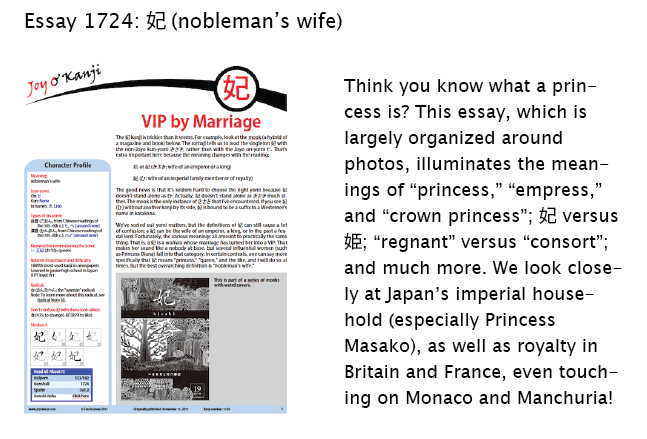Passing Things Along
Let's start with a quiz! What do you think the following term could mean:
遺伝子 (いでんし) to leave behind (at one's death) + to transmit + small entity
a. a will
b. a gene
c. inheritance in the form of money
d. inheritance in the form of objects or property
I'll block the answer with a sneak preview of the newest essay:
The answer is b. Here's the word in question:
遺伝子 (いでんし: gene) to leave behind (at one's death) + to transmit + small entity
You could also conceive of the breakdown this way:
hereditary transmission (1st 2 kanji) + small entity
I recently came across 遺伝子 during a lively Skype talk with my language partner Kensuke. We were looking at the site for Shenova, a collection of dresses that a friend of mine designs, all with science-inspired themes. The images and concepts proved to be great conversation fodder, but neither Kensuke nor I knew the relevant vocabulary in each other's language, so every design provided us with significant challenges.
For instance, the DNA Blue Genes (cute pun!) dress prompted us to talk about genes. As the conversation progressed, these terms emerged:
心電図 (しんでんず: electrocardiogram; EKG) heart + electric + figure
An EKG is a "heart electric figure"! By the way, this word was part of the newsletter contest in October. I asked what heart + electric + figure represented. Perennial winner Tilak Bhattacharjee answered the question correctly and later told me that he already knew this word. Wow!
分子 (ぶんし: molecule) to divide + small entity
A molecule may be small, but it can still divide into atoms.
原子 (げんし: atom) original, primary + small entity
It feels right that 原 is part of this word because when you break things down until they can't be subdivided anymore, you have arrived at the origin, the source, the most primary state, the 原.
I talked about all this with Kensuke back in October, but I remembered the conversation this week because essay 1724 on 妃 (nobleman's wife) contains a word similar to 遺伝 (いでん: hereditary transmission)—namely, this term:
伝承 (でんしょう: handing something down through generations)
to transmit + to inherit
In the essay, that word appears in the following book title, which features the keyword 后妃 (こうひ: empress; queen):
「初期天皇后妃の謎 欠史八代、失われた伝承の復元」
The Enigma of the Early Japanese Empresses: Eight Emperors Without Written Achievements—Reconstructing Lost Traditions
初期 (しょき: early (days)); 天皇 (てんのう: emperor of Japan); 謎 (なぞ: enigma); 欠史八代 (けっしはちだい: eight generations (of emperors) without (written) history); 失う (うしなう: to lose, shown here in the past tense of its passive voice); 復元 (ふくげん: reconstruction)
The title refers to the eight emperors (the second through the ninth) whose names appear in the early historical accounts Kojiki and Nihon Shoki but whose achievements have not been recorded for posterity. The Amazon synopsis of this work says that the key to understanding those emperors is by studying their mothers and wives. Intriguing!
It's also intriguing that 伝 can refer to transmitting such a range of things—from genetic material on the one hand to written history (or legends or folklore) on the other.
Speaking of genes, I thought for a moment that that term lay at the root of "photogenic," which the Japanese represent with this terrific kanji palindrome:
写真写り or 写真うつり (しゃしんうつり: photogenicity)
photo (1st 2 kanji) + appearance in a photo
Not only is it a 写 sandwich but this word also enables us to see two Joyo readings of 写 (シャ and うつ•る) in one fell swoop!
It initially made sense to me that "gene" lay at the heart of "photogenic" because people with great genes look good in photos! But then I realized that "-genic" is a whole different thing. Indeed, it means "well suited to."
And then "genial" falls into yet another etymological category, coming from the Latin genialis (pleasant). In a medical context, as I just learned, "genial" means "chin"! I wonder if Shenova will find some way to work chins into a future design!
Happy Thanksgiving if you celebrate! See you back here in two weeks!
❖❖❖
Did you like this post? Express your love by supporting Joy o' Kanji on Patreon:



Comments